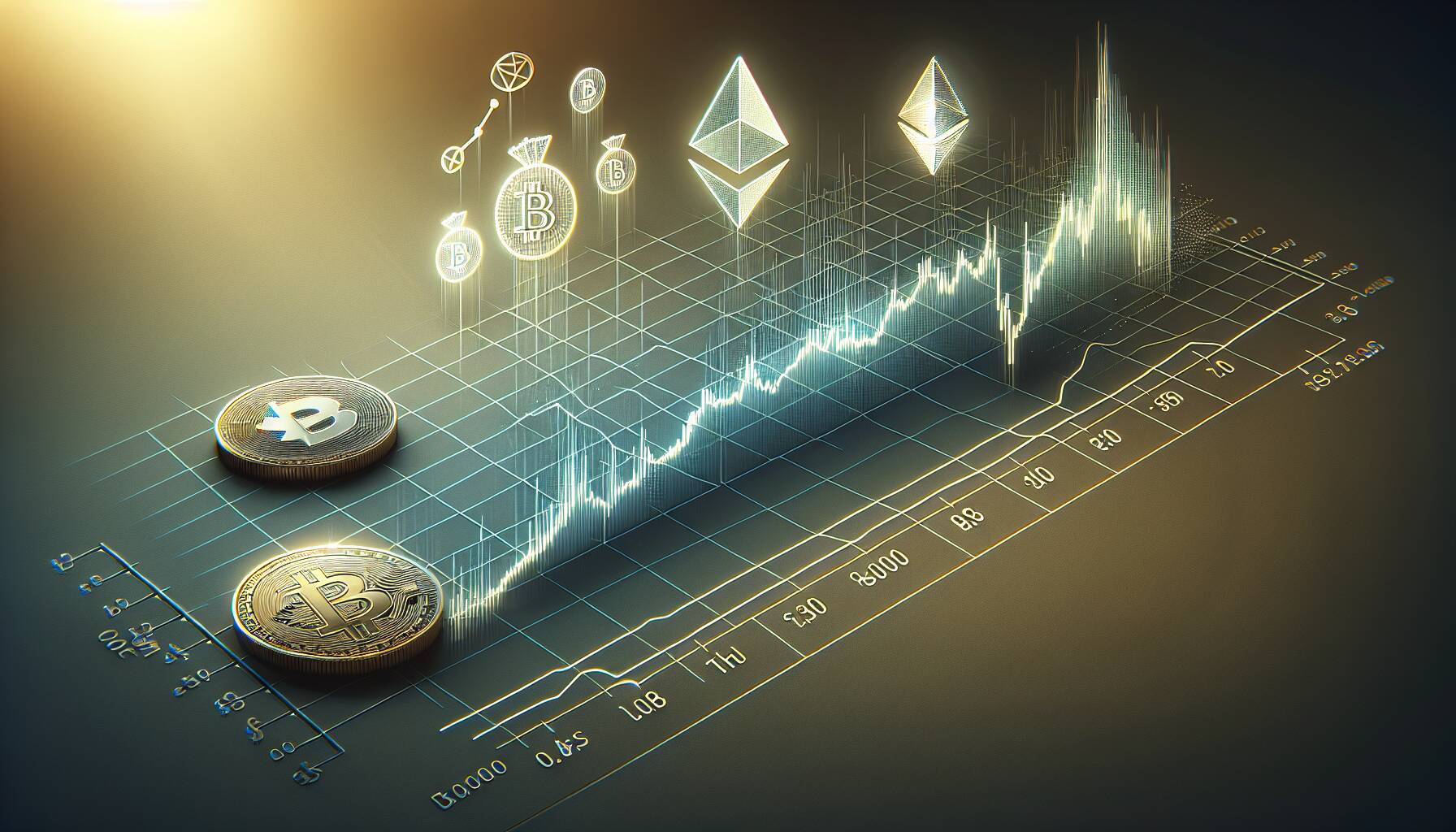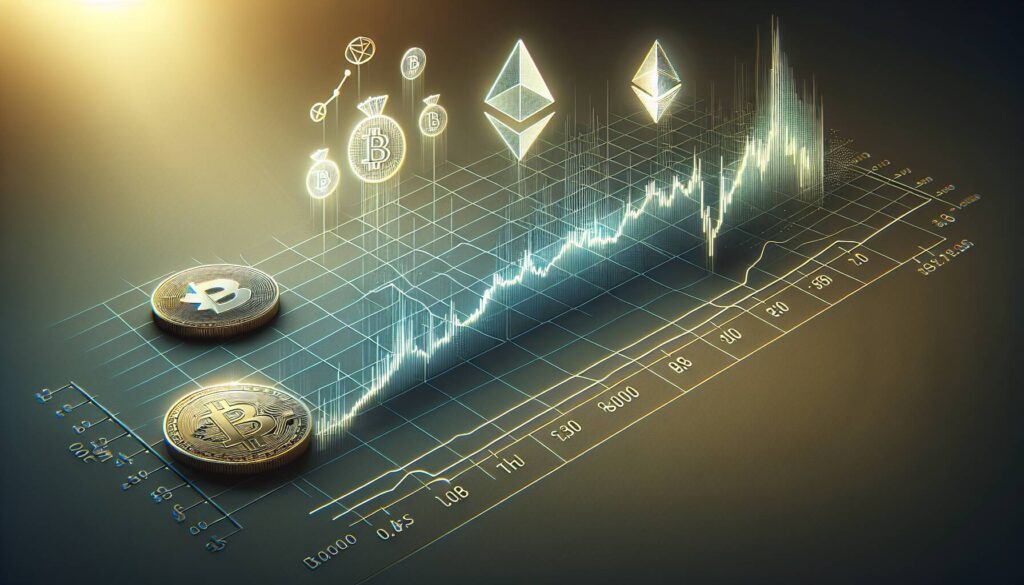In the ever-evolving landscape of the cryptocurrency market, January 2023 brought a noticeable slowdown in growth, according to a recent report from Wall Street banking giant JPMorgan. The report highlights a significant 24% drop in total trading volume, suggesting a period of adjustment following the tumultuous events surrounding the U.S. elections in November. Despite this drop, the overall market cap demonstrated resilience, soaring by 8% to approximately .4 trillion, primarily driven by strong performances in key cryptocurrencies like Bitcoin (BTC), Solana (SOL), and XRP.
JPMorgan’s analysts, led by Kenneth Worthington, posited that the recent election served as a pivotal catalyst for increased trading activity, indicating that the market is currently in a phase of finding its equilibrium after such an impactful event. Interestingly, the report noted that while trading volumes have dipped, they remain substantially higher than levels seen before the elections, reflecting ongoing interest in the sector.
“Activity and token price levels are finding their equilibrium in the post-election period,” analysts stated.
However, not all areas of the cryptocurrency ecosystem fared equally well. The report indicated that decentralized finance (DeFi) and non-fungible tokens (NFTs) experienced a more pronounced decline across various performance metrics, suggesting that these segments are struggling to maintain momentum. This downturn is noteworthy in the broader context of a market still grappling with regulatory scrutiny and evolving industry standards.
On the regulatory front, there have been some strides forward, with the emergence of a new crypto taskforce under the Biden administration and the rescindment of the contentious accounting rule known as SAB 121. These developments may help shape a more favorable environment for crypto innovation moving forward.

Impact of Slowing Crypto Ecosystem Growth in January
The recent report by JPMorgan highlights significant trends in the crypto market for January, which may influence investor behavior and market strategies. Here are the key points:
- Total Trading Volume Decline: Trading volume dropped by 24% in January, signaling a slowdown in market activity.
- Post-Election Influence: Despite the decline, trading activity remains 2x higher than before the U.S. election, showing an election-related market shift.
- Market Capitalization Growth: The total market cap increased by 8% to approximately .4 trillion, primarily driven by gains in bitcoin (BTC), solana (SOL), and XRP.
- Broad-Based Volume Declines: Average daily volume (ADV) saw decreases across the crypto ecosystem, indicating a general reduction in trading enthusiasm.
- DeFi and NFTs Struggled: The decentralized finance (DeFi) sector and non-fungible tokens (NFTs) experienced more pronounced declines in various metrics.
- Regulatory Developments: Progress on the regulatory front included the establishment of a crypto taskforce by the new Trump administration and the rescinding of SAB 121, which could impact accounting practices in crypto.
“We think the election was a catalyst for sure, and activity and token price levels are finding their equilibrium in the post-election period.” – JPMorgan Analysts
These points collectively illustrate the current state of the crypto market, influencing not only trading strategies but also regulatory perceptions and future investments, which could significantly affect readers engaged in or considering crypto investments.
Crypto Ecosystem: Insights on Activity Trends and Regulatory Developments
The recent report by JPMorgan indicating a slowdown in the crypto ecosystem’s growth during January paints a complex picture for investors and stakeholders. With total trading volume decreasing by 24%, the news presents both challenges and opportunities, especially for existing and potential investors in the cryptocurrency market. While the decrease in trading activities signals a cautious approach from traders, it is essential to recognize that the market cap has still seen a growth of approximately 8%, reaching around .4 trillion, showcasing resilience.
Comparatively, other financial institutions have reported similar trends but with varying interpretations. For instance, recent analyses from firms like Citi point to a potential weakening relationship between equities and cryptocurrencies in the long run. This perspective suggests that while crypto is currently experiencing fluctuations, the underlying foundations of investor sentiment are subject to change based on broader economic factors. Unlike the JPMorgan report, which emphasizes a recovery phase post-election, Citi’s outlook may seem more cynical, hinting at long-term volatility.
Furthermore, while BTC, SOL, and XRP have shown a concentration of market cap growth, DeFi and NFTs appear to be underperforming, indicating a shifting preference among investors. Investors in these segments may face difficulties as metric declines across these asset categories could hinder market enthusiasm. On the regulatory front, the establishment of a crypto task force by the new Trump administration may introduce much-needed stability, offering competitive advantages for compliant businesses. However, uncertain regulations can also create obstacles for existing players trying to navigate a rapidly evolving landscape.
Ultimately, this analysis reveals the dual-edged nature of the current market environment: while bullish indicators exist in terms of market cap growth, the declining trading volumes and sector-specific struggles present significant hurdles. Investors and startups alike need to make informed decisions, ensuring they are adaptable and well-prepared for continued shifts in investor behavior and regulatory challenges. The crypto ecosystem’s evolution—marked by gradual stabilization or sudden changes—will largely determine who stands to benefit and who might encounter significant setbacks.

















